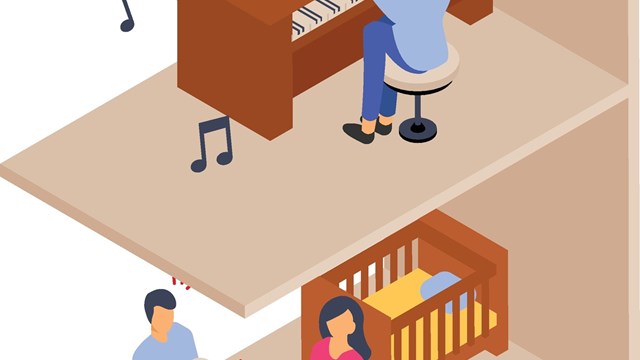You’re sitting in your living room. It’s a beautiful spring Sunday. You’ve just come home from a two-hour bike ride and you’re ready for a shower and a nap. You clean up and lie down. The breeze is coming in through the window and caressing you.
But just as you fall off to sleep, the screaming and screeching starts. It’s those kids from next door playing in their half of the interior courtyard that faces your bedroom. It sounds like a cross between Peter Pan and the Spanish Inquisition. What’s a cooperator to do?
We all know how to handle a noisy neighbor in the rarefied world of a New York City co-op or condominium; a discreet email to the managing agent with CC’s to the board members and a plea to avoid ugly and loud conflict with your neighbor by having the “management” intervene. But what do you do when the problem is coming from the building next door?
Maintaining the Peace
New York City’s noise code (Local Law 113 of 2005) went into effect on July 1, 2007. The legislation establishes a flexible, yet enforceable noise code that responds to the need for peace and quiet while maintaining New York's reputation as the "city that never sleeps." It covers everything from construction noise to your neighbor’s iPod speakers. City residents are advised to direct their noise complaints to 311, the city’s catch-all for non-emergency and quality-of-life issues. They in turn will direct your complaint to the appropriate agency including the New York City Police Department (NYPD).
Short of filing a complaint that can result in a police visit, there are a couple of less aggressive options. One is the New York Peace Institute. a non-profit dedicated to settling public disputes through mediation. It’s confidential and it’s free. Funded by the mayor’s office and private donations, they specialize in conflict resolutions.
When asked about the scenario above, Will Nassau, director of training at the New York Peace Institute, said, “We would treat it as any other noise dispute. And yes we have had similar conflicts in the past.” They have conducted mediations between residents in adjacent buildings and also between adjacent businesses. He explained the process as follows, “One party contacts us and we contact the second party. We explain our function as a mediator and encourage a conversation between the two. Mediation is a safe place to have a difficult conversation.”
Lawyering Up
Another option is the
Co-op and Condo Mediation Project of the New York City Bar
Association, sponsored by the Committees on Cooperative and
Condominium Law and the Alternative Dispute Resolution. The program
offers an impartial mediator from a pre-approved group of mediators.
The dispute can involve renters, owners, sponsors, boards of
directors, managing agents, contractors, insurers or others.
Phyllis Weisberg, outgoing chair of the New York City Bar’s Cooperative and Condominium Law Committee, said “she hasn’t seen the scenario described above presented before the committee but she has seen it in private practice. Both parties have to be willing to go for mediation for it to be successful.” The charge is $100 per party.
If you are in need of mediation services, the New York Peace Institute has offices in Manhattan and Brooklyn. They can be contacted through their website www.nypeace.org or at 212-577-1740 or 718-834-6671. The New York City Bar Association Co-op and Condo Mediation Project can be contacted at 212-382-6600.
A.J. Sidransky is a novelist and a staff writer for The Cooperator and other publications.










Leave a Comment